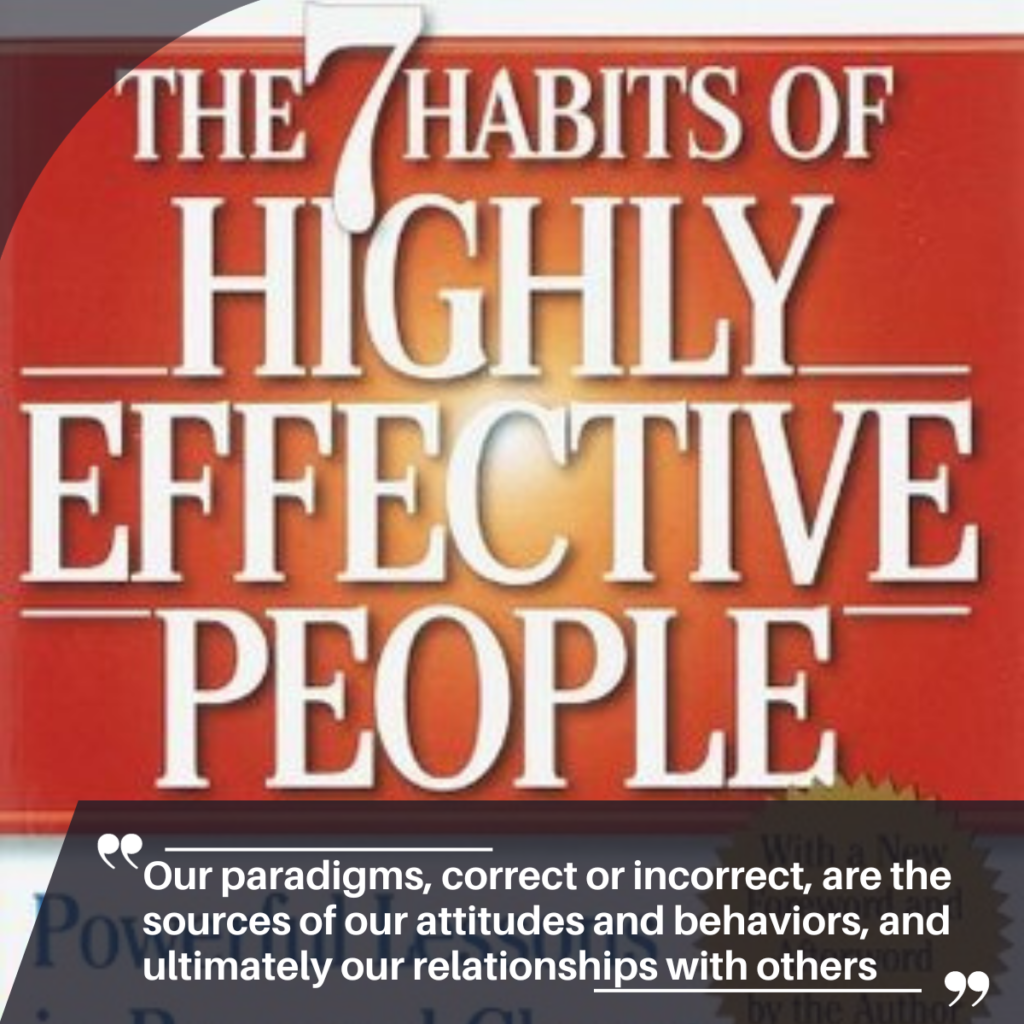Ne znam. Nisam siguran. I dobro i loše. Mixed feeling. Love-hate. Mislim da ću morati još jednom pročitati ovu knjigu. Toliko je hvaljena i toliko literature se poziva na ovu knjigu da mora nešto biti u njoj. Samo ja to nisam, barem u prvom čitanju, to pronašao. Sve napisano ima smisla ali nije me “kupila”. Barem ne još.
A možda najviše što me zasmetalo kroz knjigu je ego autora. Ne mogu odrediti točno ali kroz sve primjere u knjizi “izvire” ego autora. Mislim, tko stavlja trademark™ znak na naslove poglavlja i navike… Tako da nije slučajno što sam tako označio nazive navika kroz sažetak. Možda me tako ne dočeka Cease and desist u inboxu 😂
Autor knjige definirao je temeljnih 7 navika koje su podloga za sve druge navike i sve promjene koje želimo postići:
- Be Proactive™. Sami birate kako ćete reagirati na ono što vam život nudi.
- Begin With the End in Mind™. Birajte svoje kratkoročne, dnevne aktivnosti prema dugoročnom planu.
- Put First Things First™. Dnevno planiranje je preusko i kratkovidno. Tjedno planiranje daje bolju širu perspektivu vaših ciljeva i omogućuje fleksibilnost u rješavanju stvari koje će se neizbježno pojaviti. Ljudi su važniji od stvari, stoga planirajte svoje vrijeme u skladu s tim.
- Think Win-Win™. Većina života zahtijeva suradnju, a ne natjecanje. Radite zajedno sa suradnicima, prijateljima i obitelji na obostranu korist.
- Seek to Understand then to be Understood™. Slušajte s namjerom da razumijete, a ne da odgovorite. Dijagnosticirajte prije propitkivanja.
- Synergize™. Cijenite raznolikost u odnosima.
- Sharpen the Saw™. Kontinuirano napredujte i educirajte se.

Part One – Paradigms and Principles
“Our paradigms, correct or incorrect, are the sources of our attitudes and behaviors, and ultimately our relationships with others”
“If you don’t let a teacher know what level you are – by asking a question, or revealing your ignorance – you will not learn and grow”
“For our purposes, we will define a habit as intersection of knowledge, skill, and desire”
Part Two – Private Victory
“Habit 1: Be proactive™”
“It means [proactive] that as human beings, we are responsible for our lives. Our behavior is a function of our decisions, not our conditions. We can subordinate feelings to values. We have the initiative and responsibility to make things happen”
“If you wait to be acted upon, you will be acted upon”
“Proactive people focus their efforts in the Circle of Influence. They work on the things they can do something about”
“It is important to immediately admit and correct our mistakes so that they have no power over the next moment and we are empowered again”
“The power to make and keep commitments to ourselves is the essence of developing the basic habits of effectiveness”
“Habit 2: Begin with the End in Mind™”
“If the ladder is not leaning against the wright wall, every step we take just gets us to the wrong place faster”
“Management is efficiency in climbing the ladder of success; leadership determines whether the ladder is leaning against the right wall”
“The most effective way I know to Begin With the End in Mind is to develop a personal mission statement or philosophy or creed”
“They [peak performers] see it, they feel it, they experience it before they actually do it. They Begin with the End in Mind”
“An organizational mission statement – one that reflects the deep shared vision and values of everyone within that organization – creates a great unity and tremendous commitment”
“Habit 3: Put First Things First™”
“Effective management is putting the first things first. While leadership decides what first things are, it is management that puts them first, day-by-day, moment-by-moment. Management is discipline, carrying it out”
“If we don’t practice Habit 2, if we don’t have a clear idea of what is important, of the results we desire in our lives, we are easily diverted into responding to the urgent”
” A Quadrant II [important] organizer will need to meet six important criteria:
- Coherence: Coherence suggests that there is harmony, unity, and integrity between you vision and mission, your roles and goals
- Balance: Your tools should help you to keep balance in your life
- Focus: You need a tool that encourages you, motivates you
- A people dimension: You also need a tool that deals with people
- Flexibility: Your planning tool should be you servant
- Portability: You tool should also be portable”
“If we delegate to time, we think efficiency. If we delegate to other people, we think effectiveness”
Part Three – Public Victory
“Self-mastery and self-discipline are the foundation of good relationships with others”
“Habit 4: Think Win-Win™”
“Win-Win is a frame of mind and heart that constantly seeks mutual benefit in all human interactions”
“Habit 5: Seek First to Understand, Then te be Understood™”
“We have such a tendency to rush in, to fix things up with good advice. But we often fail to take the time to diagnose, to really deeply understand the problem first”
“But let me reiterate that the skills will not be effective unless they come form a sincere desire to understand”
“Habit 6: Synergize™”
“I’ve come to believe that the key to interpersonal synergy is intrapersonal synergy, that is synergy within ourselves”
Part Four – Renewal
“Habit 7: Sharpen the Saw™”
“Sharpening the saw is the first three dimensions – the physical, the spiritual, and the mental – is a practice I call the Private Victory. And I command to you the simple practices of spending one hour a day every day doing it – one hour a day for the rest of your life”
Dodatne poveznice
Goodreads: The 7 Habits of Highly Effective People
Amazon: The 7 Habits of Highly Effective People
Blackwell’s: The 7 Habits of Highly Effective People
Video materijali
Preuzimanje sažetka
PDF: The 7 Habits of Highly Effective People – PDF